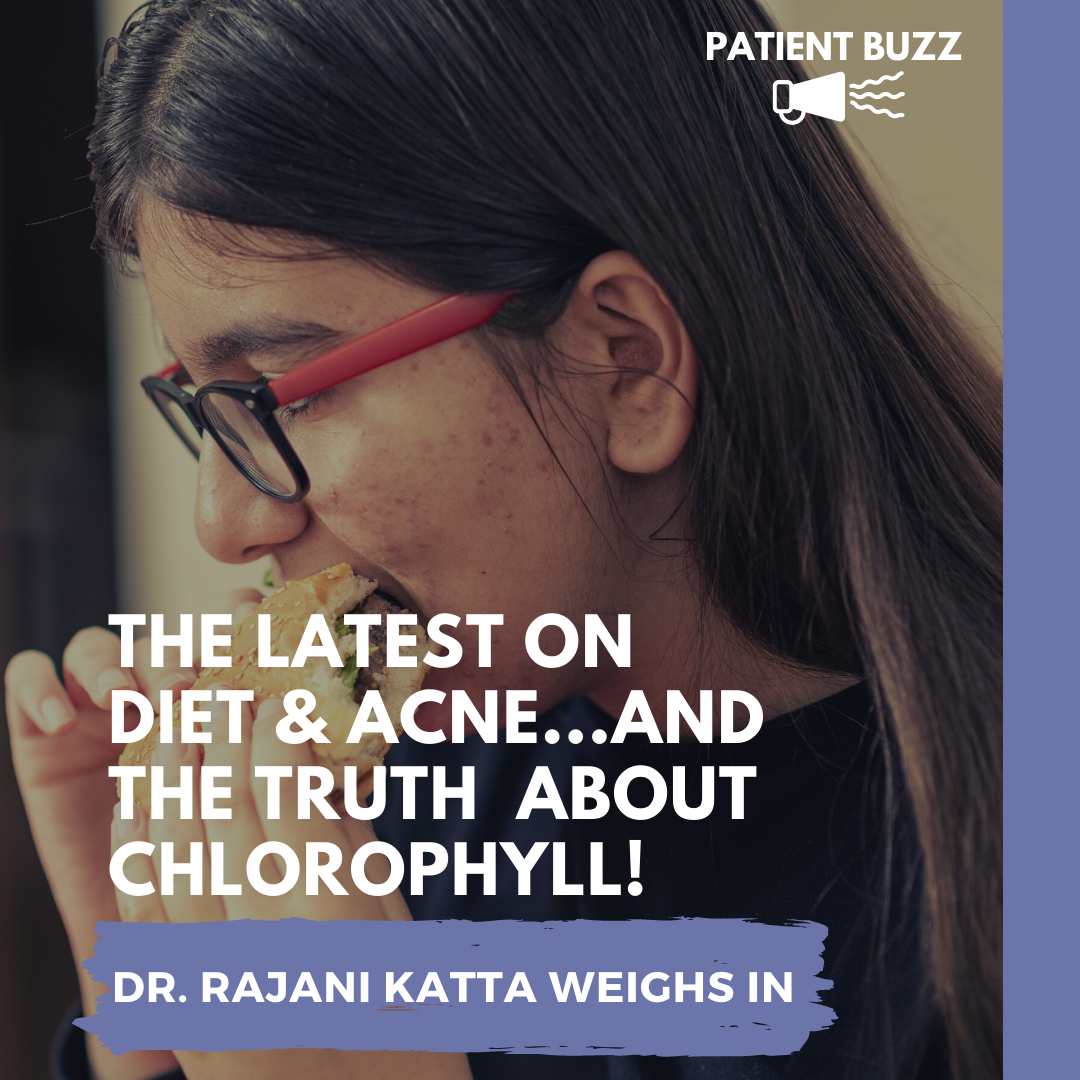Several media outlets have covered the TikTok trend of drinking chlorophyll for clearer skin. Is there any science behind drinking chlorophyll to treat acne? What are the most recent developments in the study of diet and acne?
To answer these questions, I contacted dermatologist Rajani Katta, MD, volunteer clinical faculty at Baylor College of Medicine and McGovern Medical School at UT Health. Dr. Katta is also the author of Glow: The Dermatologist’s Guide to a Whole Foods Younger Skin Diet.
Is there any science behind drinking chlorophyll for acne?
Although there’s been a lot of hype on social media about drinking chlorophyll for acne, there is minimal research on the subject. In fact, the research that seems to have triggered this fad is based not on the ingestion of chlorophyll, but rather on a topical product used in conjunction with photodynamic therapy.
In one study, containing just 24 subjects, there was a greater improvement on the half of the face that used a topical chlorophyll derivative (in conjunction with photodynamic therapy) as opposed to the other side of the face. However, we have little research looking at the ingestion of chlorophyll.
What’s your response to patients who ask whether they should drink chlorophyll to improve their skin?
When patients ask, I explain that there’s minimal evidence supporting the use of chlorophyll supplements. Beyond the question of efficacy, I’m also very concerned about safety. First, because it may act as a photosensitizer. Second, because there are many unknowns when it comes to determining the quality of dietary supplements. Consumers choosing a supplement have to be extremely cautious and recognize that there have been multiple issues reported with supplement quality control, contamination and adulteration.
For patients who are intrigued by chlorophyll, I can definitely recommend the ingestion of foods such as spinach, green peas and parsley. These foods are full of antioxidants and other powerful nutrients with anti-inflammatory properties. While they may or may not impact acne, they definitely have multiple health benefits.
What are some of the most recent developments in the study of diet and acne?
Evidence continues to accumulate linking high glycemic load diets to acne. In a cross-sectional study published last year, more than 24,000 subjects were asked to complete an online questionnaire about their dietary intake as well as current acne. An association was noted between the consumption of sugary products and sugary beverages with adult acne, with a weaker association noted for fatty products and milk. This population study, although showing correlation only, adds to the body of evidence we have linking diet and acne.
A number of randomized controlled trials have looked at low glycemic load diets as an intervention in the treatment of acne, and have supported its use. In these intervention trials, a low glycemic load diet has resulted in lower lesion counts and less sebum, as well as a decrease in the size of sebum glands and less inflammation on skin biopsy specimens. Beneficial hormonal changes have also been demonstrated.
In one of our review articles published last year, we also described a number of supplements that have been linked to acne. It’s important to ask your patients about whey protein supplements, muscle building supplements, vitamin B6 and B12 supplements, and iodine, as reports have linked all of these to acne.
What science has been proven on this topic so far? What science is still unknown?
The strongest evidence to date links high glycemic load diets to hormonal changes such as elevated levels of IGF-1 (insulin-like growth factor) that affect the sebaceous glands and skin inflammation.
An area for future research is the role of dairy. It seems to play a role in some patients, but not all. Another area for future research is the role of dietary “helpers” in the treatment of acne. Although there has been some research suggesting that probiotics and foods rich in antioxidants, omega-3 fatty acids and zinc may hold promise, this is an area that needs further research.
What dietary advice should dermatologists give their acne patients?
The most important thing I advise my patients is that you are not to blame for your acne. We know that hormonal factors and genetics are still the major causes. Having said that, your diet is under your control, and making healthy changes may have benefits for your acne.
It’s also important to meet your patients where they are. If you’re treating a teenager, it might be a challenge to speak about the benefits of more fruits and vegetables, but cutting back on sugar-loaded sodas, smoothies, coffee drinks and energy drinks may be doable. For patients who are really motivated, providing information on high glycemic load foods versus low glycemic load foods is a great place to start.
How should dermatologists counsel their acne patients about the role of nutrition in an acne treatment regimen?
I think of nutrition as an adjunct therapy in the treatment of acne. For acne patients, we’re concerned about achieving quick results that prevent permanent scarring. This means that medical therapy is still the mainstay of treatment. However, dietary change should be considered a potentially very effective adjunct therapy in the right patient population.
Is there any other information on the topic that would be helpful for dermatologists to know?
There are a lot of myths and much misinformation out there on the Internet, and our patients are sometimes lured by the quick fixes or transformations promised by acne supplements or certain diets. Just by presenting the research to date, along with actionable recommendations, we can help combat this misinformation.
Did you enjoy this Patient Buzz Expert Commentary? You can find more here.

